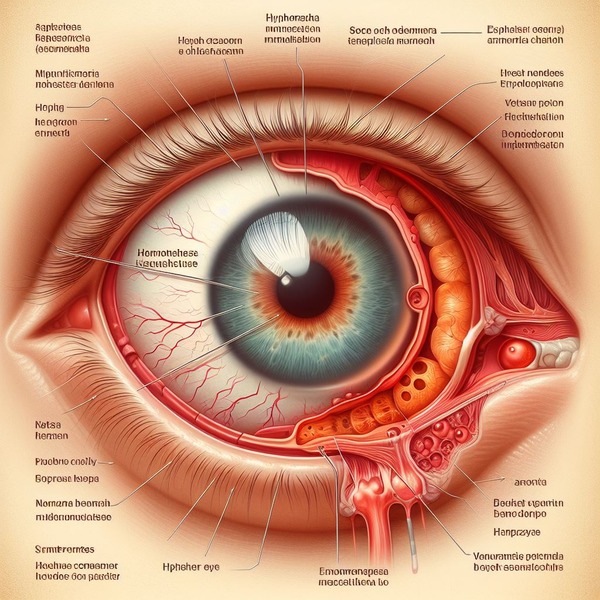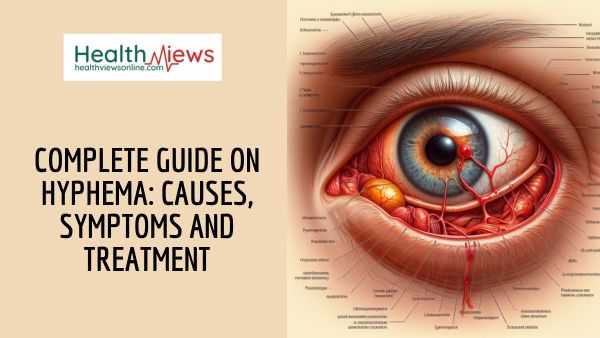What is Hyphema?
Hyphema is the medical name for bleeding inside your eye. Particularly, hyphema results in blood clotting behind your iris, which is the colored portion of your eye, and cornea, which is the outermost layer of your eye. Usually, something hitting your eye is the cause. One of the most frequent causes of hyphema is sports injuries.
Most individuals recover from a hyphema in a few days with simply at-home treatment. It is uncommon to require surgery. Severe hyphema, on the other hand, can result in blindness in the affected eye. As soon as you see any bleeding in your eye, consult your healthcare provider or go to the emergency department. Source
Also, read Complete Guide on Diabetic Retinopathy: Causes, Symptoms and Treatment

Causes
Hyphema is the presence of visible blood vessels in the anterior chamber of the eye. When you get a direct blow to the eye, the ocular arteries are disrupted, causing blood to accumulate between the iris and the cornea. The iris is the colored part of your eye, whereas the cornea is the colorless layer that covers the front of your eye. A clear fluid known as aqueous humor normally fills the space between the two, providing perfect vision.
Bleeding into the anterior chamber as a result of trauma or an underlying medical condition causes partial or whole pupil obscuration, interfering with vision. Even a low-grade hyphema can cause significant intraocular damage.
A hyphema can cause permanent eyesight problems if not treated promptly and properly. This disorder is usually caused by an eye injury that causes the pupil or iris to tear. Other, less prevalent, causes of a hyphema include:
- Surface blood vessels on the iris that are abnormal
- Disorders of blood clotting
- Eye cancers (only in rare occurrences)
- Eye infections caused by the herpes virus
- Problems with artificial lenses after cataract surgery
Symptoms
A hyphema’s symptoms are simple. They are as follows:
- visible blood in the eye front
- sensitivity to light
- pain
- blurry, clouded, or blocked vision
- If the hyphema is small, the blood may not be visible.
Risk factors
Around 70 percent of hyphemas occur in children, particularly males aged 10 to 20. They are typically caused by blunt injuries sustained during activities such as:
- Sports
- Industrial accidents
- Falls
- Fights
- Shooting BB and airsoft guns
Some factors that alter your blood can increase your chances of having a hyphema, such as:
- Leukaemia
- Haemophilia
- Sickle cell disease
- Von Willebrand disease
- Blood-thinning (anticoagulant) drugs
Diagnosis
Your doctor will diagnose hyphema by examining your eyes and completing a physical exam to rule out any other symptoms. You might need to undergo certain tests, like
- Tonometry.
- Ultrasound.
- Electroencephalogram.
Your provider will grade the hyphema based on the amount of blood in your eye. The grades range from 0 (no visible blood inside your eye) to 4 (the anterior chamber of your eye is filled with blood). Grade 4 hyphema is sometimes known as “eight ball” or “black ball” hyphema.
Treatment
If your hyphema is minor, it will go away on its own in about a week. Over-the-counter pain relievers that do not contain aspirin can be used to treat any pain. Aspirin should be avoided since it thins the blood, which might lead to further bleeding. Your doctor will select one of the following therapies for you: Source
- eye drops (steroid drops to reduce inflammation and/or dilating drops to relieve pain)
- patch over the affected eye
- bed rest
- limited eye movement (this means no reading)
- head elevated at least 40 degrees when sleeping (to help your body absorb blood).
- check eye pressure daily
Prevention
The most common cause of hyphema is trauma. When participating in contact sports such as hockey, it is essential to wear eye protection. Prompt treatment of bleeding diseases that predispose to it is also critical for avoiding the condition.
Also, read Complete Guide on Age-Related Macular Degeneration: Causes, Symptoms, and Treatment





